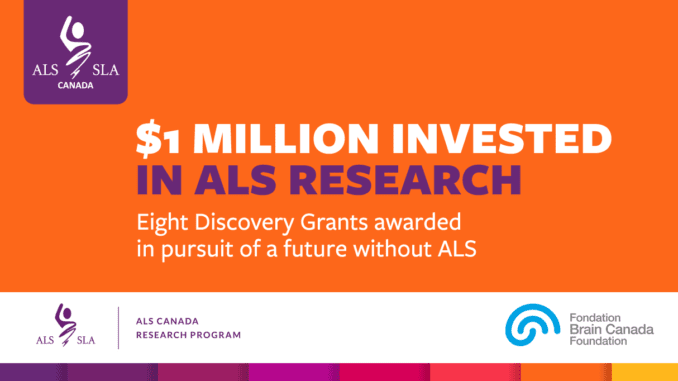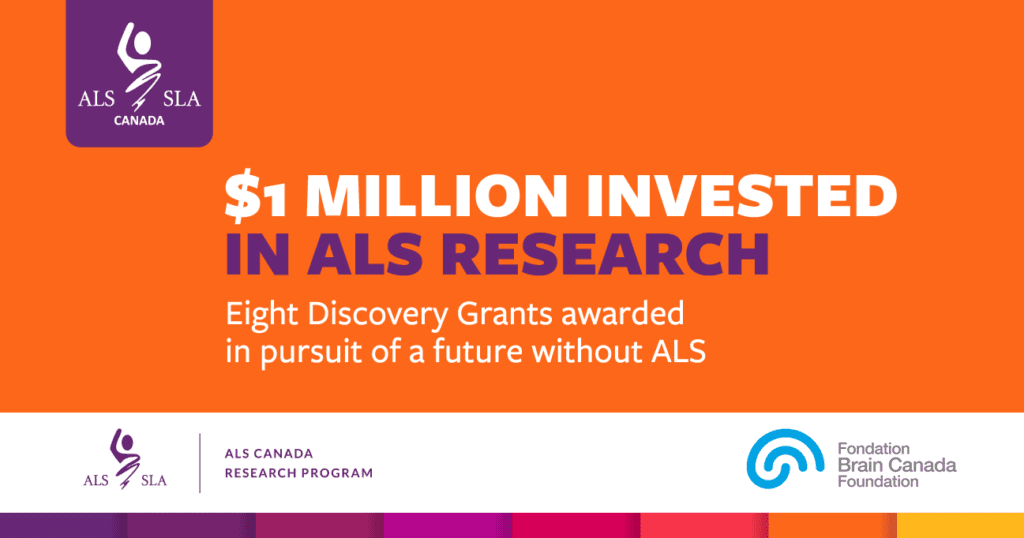

In partnership with Brain Canada Foundation, the ALS Canada Research Program awards eight Discovery Grants
TORONTO, February 11, 2021 – Sustained investment in transformative research is vital to unlocking the mysteries around the causes and progression of ALS, a devastating terminal disease that gradually paralyzes people because the brain is no longer able to communicate with the muscles of the body that are moved at will. That is why, together, the Brain Canada Foundation and ALS Canada are excited to invest $1 million toward eight research teams through the 2020 Discovery Grant Program. By fuelling scientific discovery and furthering our understanding of ALS, these grants will enable ALS researchers across Canada and around the world to collaborate on leading-edge projects that will one day have a positive impact on people living with ALS and their families, bringing hope for a future without the disease.
“Discovery Grants play a critical role in our quest to effectively treat ALS by filling important knowledge gaps in our understanding of the disease. Through these novel avenues, we continue to solve the complex puzzle that is ALS,” said Dr. David Taylor, VP Research ALS Society of Canada. “These investments also provide an environment that supports ALS research excellence in Canada, which is a critical piece of the global effort to create a future without ALS.”
The 2020 Discovery Grant Program brings together multidisciplinary research teams with expertise in various areas of ALS and neurodegenerative diseases to investigate critical areas of disease processes and clinical care. The research initiatives will use basic, clinical and translational approaches to explore the genetic causes of ALS, identify key biomarkers, pathways for future therapies and optimize care to improve the quality of life for people affected by this devastating disease.
“The passion of the ALS research community is astounding, and as someone living with ALS, I am hopeful that this sustained investment in ALS research will help continue the momentum achieved over the last few years towards solving ALS,” said Vince Quinn, who was diagnosed with ALS in 2015, and is an ALS Canada board member who had the opportunity to observe the peer review process. “Bringing together expertise, skills and experience from a wide range of areas enables ALS researchers to collaborate and answer the remaining unknowns about ALS, so new therapies can be developed to improve quality of life and extend lifespan for people diagnosed with this challenging disease.”
“With these eight Discovery Grants, ALS researchers from different disciplines will come together to collaborate on innovative projects that will accelerate progress towards the development of effective treatments and improve care for people living with ALS,” said Brain Canada President and CEO, Dr. Viviane Poupon. “The discoveries that will result from this research funding will lead to new approaches and new thinking and have the potential to inform how we tackle other neurodegenerative diseases with similar underlying mechanisms.”
The research initiatives being funded were selected following a rigorous peer-reviewed grant competition that engaged an international panel in evaluating projects grounded in scientific excellence and with the potential to quickly advance the field of ALS research. The research initiatives will seek to answer the following questions:
- How do mutations in CHCHD10 cause ALS? $125,000 award to Dr. Gary Armstrong, in collaboration with Dr. Eric Shoubridge, Montreal Neurological Institute at McGill University.
- How does loss of normal function of DNAJC7 lead to ALS? $125,000 awarded to Dr. Martin Duennwald, Western University in collaboration with Dr. Sali Farhan, Montreal Neurological Institute at McGill University.
- Enhancing a clinical trial of enoxacin in ALS through addition of biomarker analysis and better monitoring of safety. $125,000 awarded to Dr. Angela Genge, Montreal Neurological Institute at McGill University, in collaboration with Dr. Eran Hornstein, Weizmann Institute of Science.
- Can an interdisciplinary approach to mindfulness improve the quality of life for people with ALS and their primary caregivers? $121,950 awarded to Dr. Angela Genge, Montreal Neurological Institute at McGill University, in collaboration with Dr. Francesco Pagnini, Università Cattolica del Sacro Cuore and, Lana Kim McGeary, Antonietta Vitale, Nathalie Mangan, Kendra Berry, Maura Fisher, Kalyna Franko, Dr. Rami Massie, Montreal Neurological Institute at McGill University.
- Can a novel metabolic pathway serve as both a biomarker of disease progression and a pathway to treatment? $125,000 awarded to Dr. Jasna Kriz, CERVO Brain Research Centre at Université Laval, in collaboration with Dr. Nicolas Dupré, CHU de Québec-Université Laval and Dr. Angela Genge, Montreal Neurological Institute at McGill University.
- Is a novel neuroinflammatory pathway critical to motor neuron degeneration in SOD1? $125,000 awarded to Dr. Honglin Luo in collaboration with Dr. Neil Cashman, University of British Columbia.
- Through what mechanism does a probiotic cause therapeutic effect in ALS animal models? $125,000 awarded to Dr. Alex Parker, CRCHUM, Université de Montreal, in collaboration with Dr. Matthieu Ruiz, Université de Montreal.
- Is it possible to use a drug to reduce the size of ALS-associated C9orf72 repeat expansions and does that have potential to alter the disease? $124,999 awarded to Dr. Christopher Pearson, The Hospital for Sick Children (SickKids), in collaboration with Dr. Ekaterina Rogaeva, University of Toronto.
The Discovery Grant competition has been made possible by matched funds contributed by the Canada Brain Research Fund, an innovative partnership between the Government of Canada (through Health Canada) and Brain Canada, and by the generosity of provincial ALS Societies, ALS Canada donors and community-based efforts, including 40 per cent of net proceeds from the Walk to End ALS. The Discovery Grant funding adds to ALS Canada’s 2020 research commitment, which combined with the $650,000 announced in November 2020, brings its 2020 research investment to a total of $1.65 million.
With this investment and the generous support of the ALS Societies, donors and partners, the ALS Canada Research Program can continue the momentum achieved over the last several years and provide sustainable funding for ALS research in Canada at a time when health research funding is so challenged. It is the only dedicated source of ALS research funding in Canada.
About the ALS Canada Research Program and Canada’s ALS Societies
The ALS Canada Research Program funds peer-reviewed research grants and fosters collaboration amongst Canadian researchers and clinicians, helping to nurture new ideas and build capacity. As the only dedicated source of funding for ALS research in Canada, the ALS Canada Research Program aims to accelerate research impact by providing funding for the best ALS projects focused on translating scientific discoveries into treatments for ALS.
Collectively through initiatives like the Walk to End ALS, ALS Societies across Canada support the ALS Canada Research Program. ALS Societies across Canada work together to maximize our collective impact and make the greatest difference for people affected by ALS. Our approach as eight independent organizations working together enables us to respond to the variation that exists between provincial healthcare systems, where we each play a role in filling gaps by providing community-based support. ALS Societies advocate federally, provincially and locally on behalf of people and families living with ALS for policy changes that will have a meaningful impact today and in the future.
About Brain Canada
Brain Canada is a national non-profit organization that enables and supports excellent, innovative, paradigm-changing brain research in Canada. It plays a unique and invaluable role as the national convener of the brain research community. We join people, labs and platforms across the country, as well as institutions, organizations and sectors – in order to drive innovation and foster an interconnected brain research system. Our work enables Canada to excel and make even greater contributions to the global quest to understand the brain and brain disorders. Join us in funding brilliance daily, braincanada.ca.
For more information:
437-703-5391
media@als.ca
Melissa Arauz
Brain Canada
Melissa.arauz@braincanada.ca
514-377-6461
